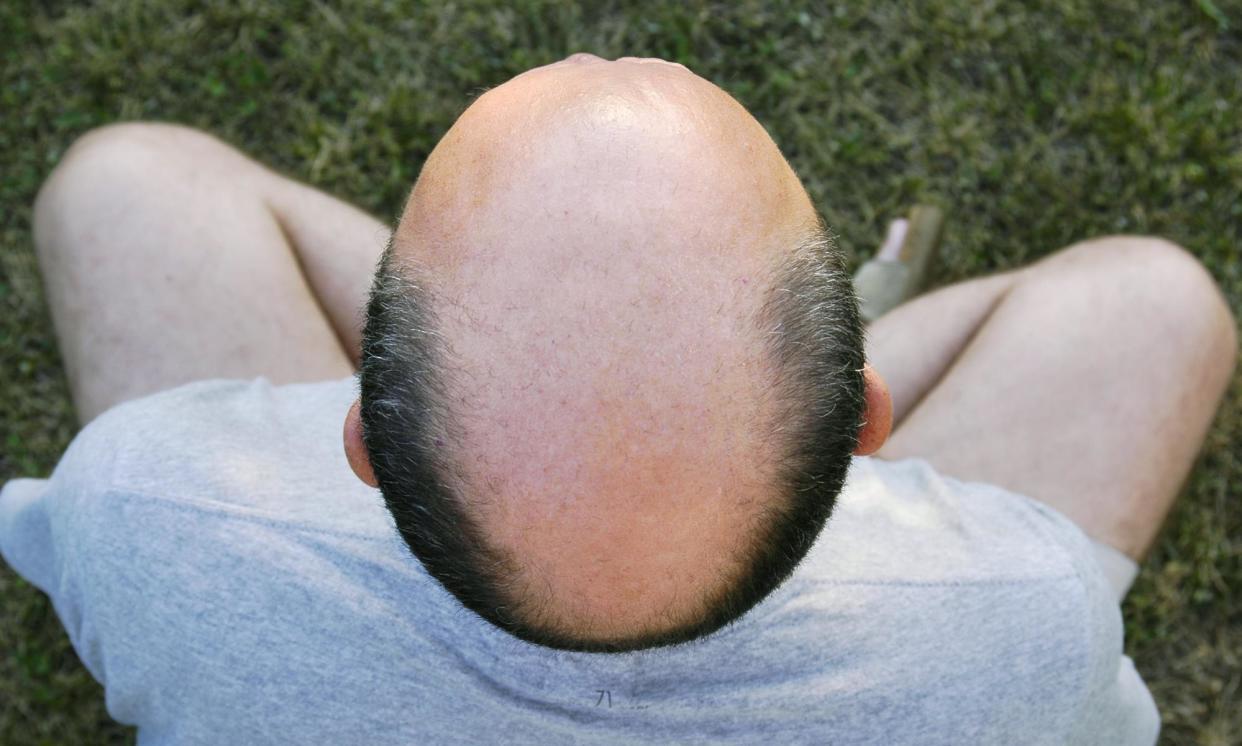Bald by Stuart Heritage review – hair today, gone tomorrow

It takes Stuart Heritage almost 30 pages to summon the courage to write about his comb-over days. There are hints of it on the way as he describes the slow-motion crisis of confidence that tracks his receding hairline. He applies the Kübler-Ross model of grief to his loss: denial, anger, bargaining, depression and acceptance. The comb-over, he says, is part of the bargaining phase, when perceptions of reality can become tragically skewed.
When the remnants of his once generous mop do flop into view, Heritage, the author and longtime Guardian contributor, does what he does best: he lays on the laughs. Men who resort to comb-overs resist the cold clippers of acceptance because any hair can feel better than none, “even if what they’ve got looks like five long strands draped across their head like spaghetti on a beach ball”.
As we slapheads know, bare bonces become inescapable identifiers and gag magnets. In Bald: How I Slowly Learned to Not Hate Having No Hair, Heritage reclaims the wisecracks. I snorted throughout what amounts to the funniest imaginable version of a grief memoir.
Happily, all the wry self-deprecation packed into an appropriately thin volume serves a grander goal: to convince the two-thirds of men who will suffer some degree of hair loss by the age of 60 to be at peace with the fact “your wonderful glossy hair is probably wrapped around a fatberg in a sewer somewhere” – and learn to love what’s left.
Heritage gives sensitivity scores to things people say to balding men – I’ll never hear ‘you have a nice-shaped head’ the same way again
Just as Heritage’s earlier book about his relationship with his brother, Don’t Be a Dick, Pete, was as much about modern masculinity as fraternal love, so Bald manages brilliantly to unpack male vanity and insecurity. It’s a book I couldn’t have written: I feel blessed never to have really cared about losing my hair in my 20s, although on reflection (and having just scrolled through my phone’s “selfie” reel) it took me way too long to reach for the clippers. But I know how emotionally crippling the process can be.
Heritage relays his denial and anger phases with often moving candour. Before his comb-over came the “Regaine years”, during which the writer tried to preserve his surviving hair in a “zombified state”. I could almost picture him wincing as he recalls the pile of empty Regaine tubs hidden in the back of his wardrobe lest anyone spot them in the bin.
He breaks up the text with a genuinely informative glossary, including hair loss science that was new to me. Later he gives sensitivity scores to the things people say to balding men. (I’ll never hear “you have a nice-shaped head” in the same way again.) And there’s a rundown of his “bald heroes”; Stanley Tucci tops a list that also includes the writer’s father, whose obliviousness to baldness is ultimately inspiring.
There are some deftly handled interviews. A barber and a menswear stylist provide succour and practical advice. And there’s a poignant conversation with Fiona, a friend whose experience of hair loss following treatment for a brain tumour helps snap Heritage out of the depression stage.
The writer presents himself as a balding mentor and – in time – champion. He stands ready to hold the hand of any vulnerable man who might otherwise fall into a pit of despair on the internet. Online, he points out, searches for help tend to lead to content created by a hair-loss treatment industry that survives by making people feel bad about themselves.
It all leads to a concluding conversation with a huge name in balding that comes as such a joyous surprise that it would be churlish to spoil it here. Let’s just say the guy on the other end of the Zoom call says something that lights up Heritage’s eyes like those of a Sunday league player told by Lionel Messi that he has a great first touch. At last our hairless guide finds himself in the acceptance phase. So, too, will any reader even a little bit worried about balding – ideally before the comb-over days.
• Bald: How I Slowly Learned to Not Hate Having No Hair (And You Can Too) by Stuart Heritage is published by Profile (£11.99) is published on 25 April. To support the Guardian and Observer, order your copy at guardianbookshop.com. Delivery charges may apply.


